Chronicles of Us, Part 3: The Shoes of Grief
After his two teenage sons were killed by police officers, Daniel took refuge in repairing torn shoes, in a dying city where oil once meant a great hope. Another moving story by La Vida de Nos.


Photos: Luis José Boada
Daniel holds a pair of worn out shoes. The soles are barely attached, two or three more steps and they’ll fall off. Sitting at his house’s patio in Maturín (once a prosperous town of oil drilling,) he spends hours sewing shoes.
He learned the craft by watching others. Practicing. Step by step. Repairing shoes became an obsession. He sewed with devotion and care, beginning once in great pain. After the death of his two oldest sons, Daniel decided to dry his tears with work. This is how he became an expert in patching old shoes, which also served him as another income of money.
“I started working when I was 18,” he’d tell his teen sons, Gabriel David and Daniel Esteban (also known as El Gato —“the cat”— for his catlike eyes.)
They were different, but always very close. 17 and 16-years old, they moved around with that teenage drive that seeks independence, that makes some children grow when they’re still a long way to become adults.
“I would have liked to watch them grow. Tomorrow, El Gato would be turning 17.”
But neither El Gato nor Gabriel would leave their teenage years.
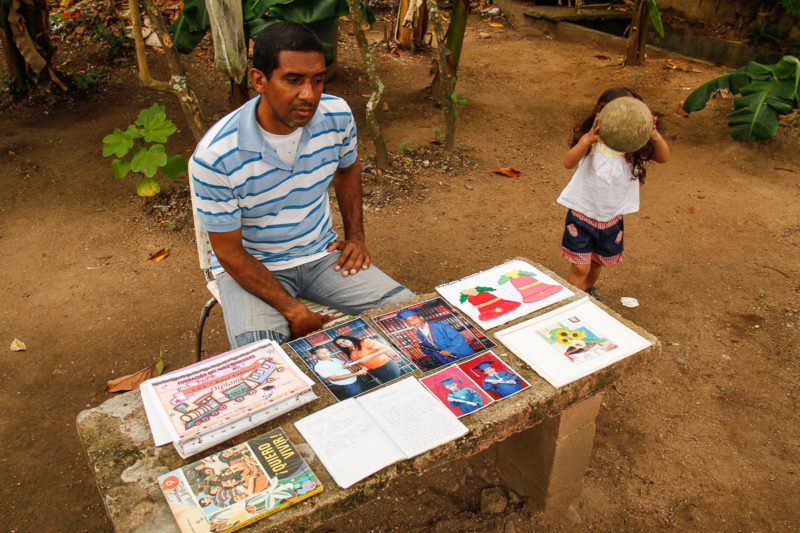 The last time he saw them, it was a March, 2016 morning. They used to sleep next to each other in the room they shared with two younger siblings. Daniel never knew why he got that odd feeling, that cold, that fear creeping inside his stomach.
The last time he saw them, it was a March, 2016 morning. They used to sleep next to each other in the room they shared with two younger siblings. Daniel never knew why he got that odd feeling, that cold, that fear creeping inside his stomach.
“Oh, no, man, stop attracting that bad vibe,” his wife said when he voiced his feelings. “You get rid of those thoughts.”
And so he tried. He got dressed and went to the bank. The bad gut-feeling haunted him throughout the day, though, and he wouldn’t understand it until much later: “Death speaks to you. That day, it did to me.”
By that time, the crisis had already embraced the nation. Daniel sacrificed family time for more working hours, yet no matter how hard he tried, earnings were always too low. “I couldn’t buy a can of baby food for my youngest daughter, who was just born.”
It wasn’t always like this. Once a lifetime ago, well-paid jobs were available. During Maturín’s oil boom, electric trolleys where the craze for children and they filled the public squares. The Venezuelan northeastern city transformed, its inhabitants felt the bonanza of the black gold while the discovery of the El Furrial oilfield, in the 80’s, propelled a huge growth in a short while. Drills, companies and investments came. The quiet little town started to look like a city. The El Furrial oil prospect was so promising that, by 1998, 453 thousand barrels a day were being pumped out, and new oil fields were discovered.
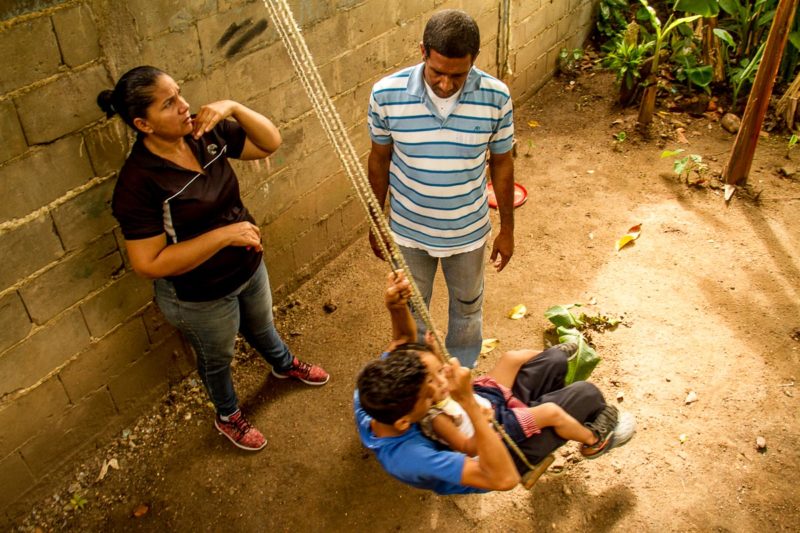 “Let’s go for another ride, dad!” Gabriel David and El Gato would shout during car rides when they were little.
“Let’s go for another ride, dad!” Gabriel David and El Gato would shout during car rides when they were little.
The call found Daniel on his way home. The voice burned with anguish and, in the little sense it made, the husband of a niece begged for his presence. The neighborhood was in turmoil and, during a police operation, three teenagers were killed.
Venezuela is one of the most violent countries in the world. According to Human Rights NGO Observatorio Venezolano de Violencia, only in 2018, 23,047 people were killed, and almost a third of the victims died at the hands of State security forces.
Daniel arrived home attacked by the haul of sirens. Patrols, policemen and neighbors crowded, some watching him in silence. There was blood and a police yellow tape blocking the way, and an invisible rock pressing over his chest. He was afraid to ask, maybe knowing the answer.
“Daniel, your boys! Daniel, two of the victims are your boys!”
He collapsed.
That voice continued on loop in his head, as if whispering in his ear. “Yes, it was death who spoke to me,” he insists.
Escaping his thoughts, Daniel found the shoes repair trade, the only way he could trick his mind into other subjects, or so he says. The ghosts still suddenly haunt him, almost daily, especially at night. He tries not to be idle. “When you’re doing nothing, you think a lot and the pain comes back.”
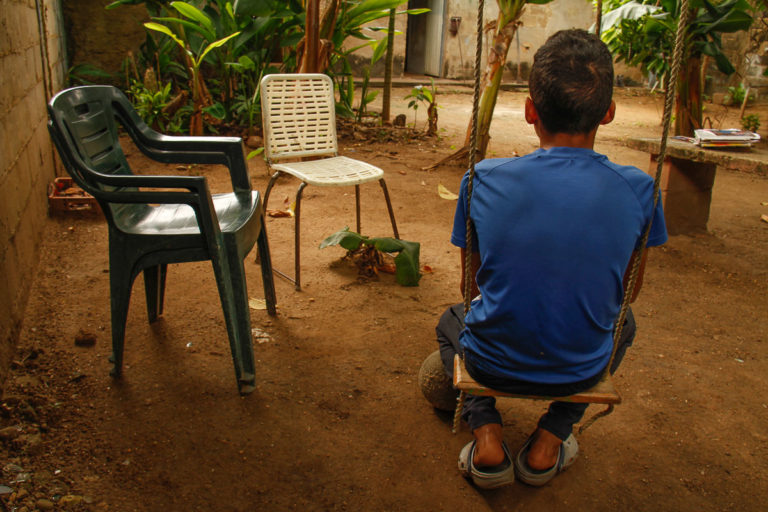 Now he spends more time at home, his new job allows him more time to his family. 15 days went by since the birth of his youngest daughter when the boys were killed. He clings to her and to his other two kids.
Now he spends more time at home, his new job allows him more time to his family. 15 days went by since the birth of his youngest daughter when the boys were killed. He clings to her and to his other two kids.
Most of his orders come from the neighborhood where he works as security, El Faro, in the heart of the Maturín industrial zone, a middle class’ suburb home for many of PDVSA’s employees. In the midst of a hyperinflationary vortex, many of those oil workers go through life with torn shoes.
“What’s up, dog?” a customer says. “Could you fix me this pair? I can’t afford new ones, sew these a bit, buddy, please.”
But the neighborhood’s cobbler has as a policy of not taking many orders. Although money is needed at home, he wants time to rest and share with his children.
“The candle went out again, light it!” his wife says from inside the house. “I like it on. It must always be on!”
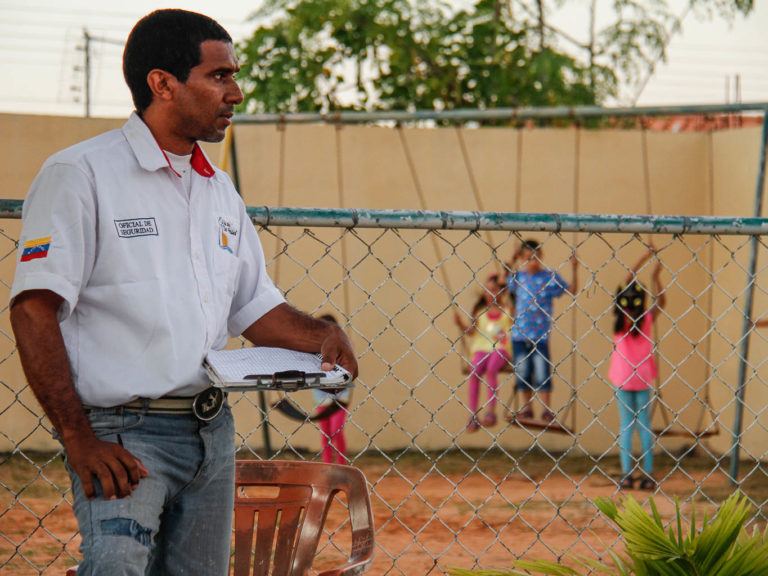 He keeps his first repairs under the tree, like trophies, small wonder of when it took him days to sew them, and it was for a very special customer.
He keeps his first repairs under the tree, like trophies, small wonder of when it took him days to sew them, and it was for a very special customer.
“Why are these shoes torn?” his wife asked when she found them.
“They were Gabriel’s. He wore them like this last Christmas. We didn’t have money for new ones and he didn’t want you to worry.”
Forgive me, son, Daniel said to himself then. He had to repair them.
Even though the sunlight shone through the window and illuminated the room in the afternoon, the candle was still lit. Daniel went through the house.
“They look good, don’t they?”
“Please, light the candle, man. The breeze blew it off again, it must always be lit.”
He complied. He approached the table, studying it for a moment. There was the candle and two faces, smiling, framed, distant but still here.
“Look son,” Daniel said. “Here are your shoes, I fixed them, look. I sewed them. Don’t they look good? I keep them in your and your brother’s room, and nobody can touch them. The other day your cousin came and wanted to try them, and I said no. I think he hated that.”
Before going to bed, he checks on his other children. Two teens and a baby asleep. He turns off the light, gives them blessings. Of the four beds, two are still in use, the others are empty and intact.
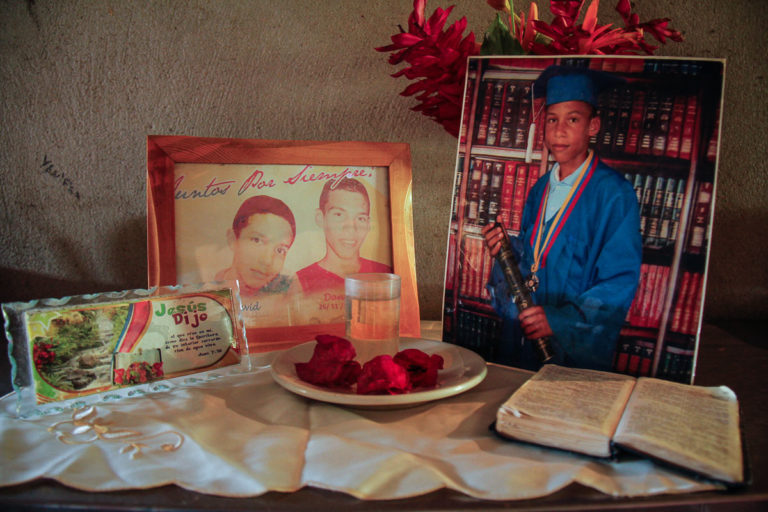 This story, originally published on La Vida de Nos, is part of the project La Vida de Nos Itinerante, where people from all over the country take part in workshops to improve their skills to tell real stories. Pictures by Luis José Boada. Translation: Josefina Blanco / First edition: Luke Robert Blake. second edition: Caracas Chronicles Team.
This story, originally published on La Vida de Nos, is part of the project La Vida de Nos Itinerante, where people from all over the country take part in workshops to improve their skills to tell real stories. Pictures by Luis José Boada. Translation: Josefina Blanco / First edition: Luke Robert Blake. second edition: Caracas Chronicles Team.
Caracas Chronicles is 100% reader-supported.
We’ve been able to hang on for 22 years in one of the craziest media landscapes in the world. We’ve seen different media outlets in Venezuela (and abroad) closing shop, something we’re looking to avoid at all costs. Your collaboration goes a long way in helping us weather the storm.
Donate




